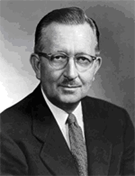 |
| Thomas Rowe Price, Jr. |
| Born: | |
| Affiliations: |
|
| Most Famous For: | Price is considered to be "the father of growth investing." He founded the investment firm T. Rowe Price Associates, Inc. |
Personal Profile
Thomas Rowe Price spent his formative years struggling with the Depression, and the lesson he learned was not to stay out of stocks but to embrace them. Price viewed financial markets as cyclical. As a "crowd opposer," he took to investing in good companies for the long term, which was virtually unheard of at this time. His investment philosophy was that investors had to put more focus on individual stock-picking for the long term. Discipline, process consistency and fundamental research became the basis for his successful investing career. .
Price graduated from Swarthmore College
Over time, Price became frustrated by the fact that "the firm did not fully comprehend his definition of growth stocks," so Price founded T. Rowe Price Associates in 1937. At that time, he defied convention by charging fees based on investments that clients had with the firm, not commissions, and always "putting the client's interests first." Price believed that as his clients prospered, the firm would too.
In 1950, he introduced his first mutual fund, the T. Rowe Price Growth Stock Fund. He was the company's CEO until his retirement in the late 1960s. He eventually sold the company in the early 1970s, but the firm retained his name and, today, one of the nation's premier investment houses.
Investment Style
Thomas Rowe Price's investment management philosophy was based on investment discipline, process consistency and fundamental analysis. He pioneered the methodology of growth investing by focusing on well-managed companies in fertile fields whose earnings and dividends were expected to grow faster than inflation and the overall economy. John Train, author of "The Money Masters", says that Price looked for these characteristics in growth companies:
- Superior research to develop products and markets.
- A lack of cutthroat competition.
- A comparative immunity from government regulation.
- Low total labor costs, but well-paid employees.
- At least a 10% return on invested capital, sustained high profit margins, and a superior growth of earnings per share.
Price and his firm became extremely successful employing the growth stock approach to buying stocks. By 1965, he had spent almost thirty years as a growth advocate. At that time, many of his favorite stocks became known in the market as "T. Rowe Price stocks." However, by the late '60s, he had become wary of the market's unquestioning enthusiasm for growth stocks – he felt the time had come for investors to change their orientation. He thought price multiples had become unreasonable and decided that the long bull market was over. This is when he began to sell his interests in T. Rowe Price Associates.
By 1973-1974, what Price's forecast took shape and growth stocks fell hard and fast. Much to Price's dismay, his namesake firm barely managed to survive. Obviously, the term, "irrational exuberance" didn't exist in those days, but its destructive force was well appreciated by Thomas Rowe Price.
Quotes
"It is better to be early than too late in recognizing the passing of one era, the waning of old investment favorites and the advent of a new era affording new opportunities for the investor."
"If we do well for the client, we'll be taken care of."
"Change is the investor's only certainty."
"No one can see ahead three years, let alone five or ten. Competition, new inventions - all kinds of things - can change the situation in twelve months."
No comments:
Post a Comment